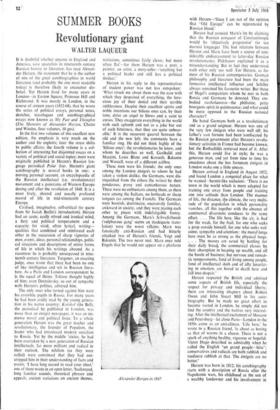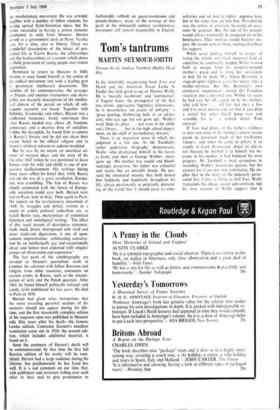Revolutionary giant
SUMMER BOOKS
WALTER LAQUEUR
It is doubtful whether anyone in England and America, save specialists in nineteenth century Russian history or literature, has read Alexan- der Herzen; the statement that he is the author of one of the great autobiographies in world literature (and probably the one most readable today) is therefore likely to encounter dis- belief. Yet Herzen lived for many years in London—in Euston Square, Primrose Hill and Richmond. It was mostly in London, in the course of sixteen years (1852-68), that he wrote the series of political essays, personal notes, sketches, travelogues and autobiographical essays now known as My Past and Thoughts (The Memoirs of Alexander Herzen, Chatto and Windus, four volumes, 10 gns).
In the first two volumes of this excellent new edition, the emphasis is very much on the author and his exploits; later the stress shifts to public affairs; the fourth volume is a col- lection of interesting but disjointed essays on a variety of political and social topics; most were originally published in Herzen's Russian lan- guage periodical Polar Star. Herzen's giant autobiography is several books in one : a moving personal account, an encyclopaedia of the Russian intellectual (i.e. revolutionary) movement and a panorama of Western Europe during and after the revolution of 1848. It is a most lively, shrewd and usually profound record of life in mid-nineteenth century Europe.
Civilised, imaginative, self-critical (to quote from Sir Isaiah Berlin's introduction), Herzen had an acute, easily stirred and ironical mind, a fiery and political temperament and a capacity for vivid, often lyrical, writing— qualities that combined and reinforced each other in the succession of sharp vignettes of men, events, ideas, personal relationships, politi- cal situations and descriptions of entire forms of life in which his writings abound. As a raconteur he is probably unsurpassed in nine- teenth century literature. Turgenev, an exacting judge, once wrote that there had been no one of like intelligence and wit in Russian litera- ture. As a Paris and London correspondent he is the equal of Heine. Tolstoy thought highly of him; even Dostoievsky, so out of sympathy with Herzen's politics, admired him.
The only ones who turned against him were his erstwhile pupils in Russia. For many years he had been avidly read by the young genera- tion in his native country; Kolokol (the Bell), the periodical he published in London, was more than an émigré newspaper, it was an im- mense moral and political force. To a whole generation Herzen was the great teacher and revolutionary, the founder of Populism, the leader who had introduced modern socialism to Russia. Yet by the middle 'sixties, he had been overtaken by a new generation of Russian intellectuals, far more militant and radical in their outlook. The nihilists (as they were called) were convinced that they had out- stripped him in their understanding of facts and events. 'I have long ceased to read your sheet,' one of them wrote in an open letter, `hackneyed, long familiar sounds, rhetorical phrases and appeals, ancient variations on ancient themes, witticisms, sometimes fairly clever, but more often flat'—for them Herzen was a poet, a painter. an artist, a story-teller---`anything but a political leader and still less a political thinker.'
Herzen in his reply to the representatives of student power was not less outspoken : 'What struck me about them was the ease with which they despaired of everything, the fero- cious joy of their denial and their terrible ruthlessness. Despite their excellent spirits and noble intentions our bilious ones can, by their tone, drive an angel to blows and a saint to curses. They exaggerate everything in the world with such aplomb and not as -a joke but out of such bitterness, that they are quite unbear- able.' It is the recurrent quarrel between the old and the new left; the comments have a familiar ring. He did not think highly of the `bilious ones'; the revolutionaries he knew, and whom he describes so well, Garibaldi and Mazzini, Louis Blanc and Kossuth, Bakunin and Worcell, were of a different calibre.
These men were his friends; the only ones among the London emigres to whom he had taken a violent dislike, the Germans, were dis- tinguished from the others (he writes) by their ponderous, prosy and cantankerous nature. There were no enthusiasts among them, as there were among the Italians, no hotheads or sharp tongues (as among the French). The Germans were boorish,' doctrinaire, excessively familiar, awkward in society, and they werejearing each other to pieces with indefatigable frenzy. Among the Germans, Marx's Schwefelbande (`sulphurous gang' seems an inadequate trans- lation) were the worst villains. Marx was fanatically anti-Russian and had bitterly attacked two of Herzen's friends, Vogt and Bakunin. The two never met. Marx once told Engels that he would not appear on a platform
Alexander Herzen in 1847 with Herzen—`Since I am not of the opinion that "Old Europe" can be rejuvenated by Russian blood.'
Herzen had aroused Marx's ire by claiming that the Russian conquest of Constantinople would be 'objectively progressive' (to use marxist language). The bad relations between Herzen and Marx have been a source of con- siderable embarrassment to latter-day Russian revolutionaries; Plekhanov explained it as a misunderstanding. But in fact they understood each other only too well. For Herzen, as for most of his Russian contemporaries, German philosophy and literature had been the main formative intellectual influence and Schiller always remained his favourite writer. But those of Hegel's compatriots whom he met in both Russia and Germany he detested. They em- bodied meshshanstvo—the philistine, petty bourgeois spirit in quintessence; and what could be more opposed to the Russian national character?
He hated Germans both as a revolutionary and as a grand seigneur. Herzen was one of the very few emigres who were well off; his father's vast fortune had been 'confiscated by the Russian government after Herzen's revolu- tionary activities in France had become known, but the Rothschilds retrieved most of it. After this, Herzen could live in style; he was a generous man, and yet from time to time his anecdotes about the less fortunate émigrés in London make one a little uneasy.
Herzen arrived in England, in August 1852, and found London a congenial place for what he wanted—hermit-like seclusion: 'There is no town in the world which is more adapted for training one away from people and training one into solitude than London. The manner of life, the distance, the climate, the very multi- tude of the population in which personality vanishes, all this together with the absence of continental diversions conduces to the same effect. . . . The life here, like the air, is bad for the weak, for the frail, for one who seeks a prop outside himself, for one who seeks wel- come, sympathy and attention: the moral lungs here must be as strong as the physical lungs. . . . The masses are saved by battling for their daily bread, the commercial classes by their absorption in heaping up wealth, and all the bustle of business; but nervous and roman- tic temperaments, fond of living among people, fond of intellectual sloth and of idly luxuriat- ing in emotion, are bored to death here and fall into despair.'
Herzen respected the British and admired some aspects of British life, especially the respect for privacy and individual liberty; there are interesting chapters about Robert Owen and John Stuart Mill in his auto- biography. But he made no great effort to become rooted in London, he simply did not find the country and the natives very interest- ing. After the intellectual excitement of Moscow and Petersburg—let alone Paris—London in the 1850s came as an anti-climax. 'Life here,' he wrote to a Russian friend, 'is about as boring as that of worms in a cheese. There is not a spark of anything healthy, vigorous or hopeful. Victor Hugo described us admirably when he called the English "un grand peuple—bete"; conservatives and radicals are both rubbish and mediocre rubbish at that. The émigrés are no better.'
Herzen was born in 1812; his autobiography starts with a description of Russia after the Napoleonic wars, his childhood as the son of a wealthy landowner and his involvement in the revolutionary movement. He was arrested, together with a number of fellow students, for having spread Saint-Simonian ideas, but his father succeeded in having a prison sentence commuted to exile from Moscow. Herzen served as a government clerk in Perm, Vyatka and, for a time, also in Siberia. There are wonderful descriptions of the idiocy of pro- vincial life in Tsarist Russia, the arbitrariness and the backwardness of a system whidh drove a whole generation of young people into violent opposition.
Permitted to return to Moscow in 1840, Herzen at once found himself at the centre of the radical movement and took a leading part in passionate intellectual discussions. The sketches of his contemporaries, the passages on friends and enemies (westerners and slavo- phils), are masterly descriptions of the intellec- tual climate of the period on which all sub- sequent accounts are based. Together with Belinsky, Granovsky and others, Herzen was a confirmed westerner, firmly convinced that what Russia needed was, above all, freedom, democracy and a massive dose of socialism. Unlike the slavophils, he found little to admire in Russia's history and he did not share their mystic belief in the official religion and in Russia's ultimate mission to redeem mankind.
But he was by no means an uncritical ad- mirer of western ideas. and the story of his life after 1847 (when he was permitted to leave Russia with his wife and child) is one of pro- gressive disillusionment. His writings during those years reflect his belief that, while Russia was On the eve of a great revolution, Europe, too, was crumbling. The fate of Russia was closely connected with the future of Europe. only socialism could save both. Herzen went first to Paris, later to Italy. Then again to Paris. His reports on the revolutionary movement of 1848, its struggles and defeat, written in a mood of ardent political radicalism are, as Isaiah Berlin says, masterpieces of committed historical and sociological writing: 'The effect of this rapid torrent of descriptive sentences, fresh, lucid, direct, interspersed with vivid and never irrelevant digressions, is one of spon- taneous improvisation: exhilarating conversa- tion by an intellectually gay and exceptionally clever and honest man endowed with singular powers of observation and expression.'
The last parts of the autobiography are devoted to Herzen's journalistic work in London. his relations with fellow Russians and emigres from other countries, comments on current events in Russia, such as the emanci- pation of serfs and the Polish question. After 1863, he found himself politically isolated; and family strife embittered his last years. He died in Paris in 1870.
Herzen had given strict instructions that the more revealing personal sections of his memoirs should not appear during his life- time, and the first reasonably complete edition of his magnum opus was published in Moscow only fifty years after his death—the famous Lemke edition. Constance Garnett's excellent translation came out in 1924; the present edi- tion, which includes additional material, is based on it.
Soon the centenary of Herzen's death will be commemorated; by that time the first full Russian edition of his works will be com- pleted. Herzen had a large audience during his lifetime, but posthumously he has fared less well. It is a sad comment on our time that, with publishers and reviewers falling over each other in their zeal to give prominence to
fashionable rubbish on quasi-revolutions and pseudo-thinkers, many of the writings of this giant of the nineteenth century revolutionary movement still remain inaccessible in English.











































 Previous page
Previous page